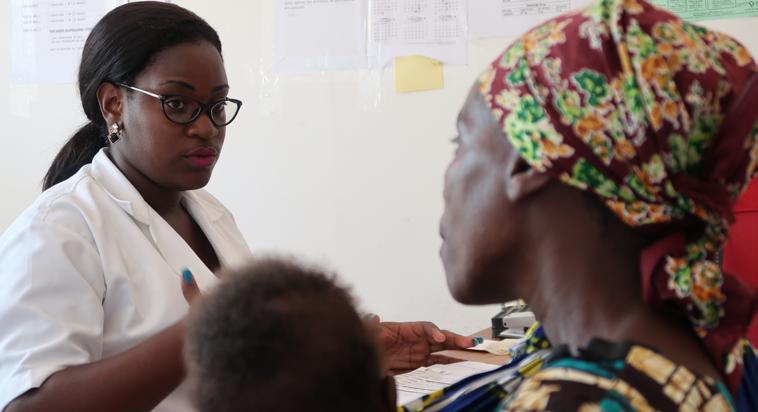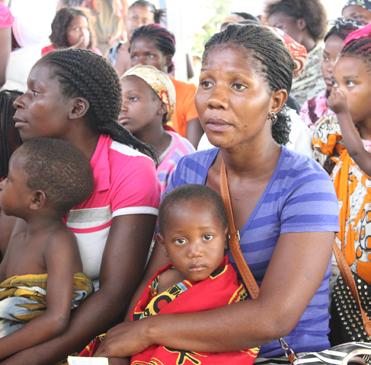Maternal, Child and Reproductive Health Initiative





We work to improve the health of the most vulnerable women, children and adolescents in the developing world. We do so in many areas, including malaria in pregnancy, childhood malaria, the causes of maternal mortality, human papillomavirus (HPV) infection, the impact of HIV/AIDS on women’s and children’s health emerging diseases in pregnancy such as COVID-19 or maternal immunisation, with particular focus on inequalities. Our model is based on the translation of scientific evidence to concrete actions undertaken to inform and influence policy and to train health professionals in various countries.
It is essential to maintain the focus on the maternal and child health agenda defined by the Sustainable Development Goals. Despite improvements in women’s and children’s health over the last decade, both groups still face disproportionate inequalities in access to quality health care. For many women in the developing world, pregnancy and childbirth are particularly frightening and dangerous times in their lives, when illness and even death happen all too frequently. This not only affects women but also their families and communities. However, solely addressing the direct obstetric causes of maternal mortality is not enough. Taken together HIV/AIDS, malaria and tuberculosis are among the leading causes of maternal mortality in low- and middleincome countries.
Finally, the COVID-19 pandemic has disrupted access to, and use of, maternal, child and adolescent health services. Children, adolescents and mothers are not getting the care they need. For some diseases, this can have lifelong and sometimes lifethreatening consequences. In 2021, the largest
sustained decline in childhood vaccinations in approximately 30 years was recorded. As a result, 25 million children missed out on one or more doses of the diphtheria, tetanus and pertussis (DTP3) vaccines through routine immunization services in 2021 alone, highlighting the growing number of children at risk of devastating but preventable diseases.
Globally, more than a quarter of coverage for the human papillomavirus (HPV) vaccine, which prevents cervical cancer, has been lost. This has serious implications for the health of women and girls, as global coverage of the first dose of the HPV vaccine is only 15%. The COVID-19 pandemic continued to affect the performance of HPV programmes in LMICs through school closures, delayed vaccination rounds and product stock-outs. The number of zero-dose girls (i.e., girls in countries with HPV who have never received a first dose of HPV vaccine) increased by 3.5 million globally since 2019.
Every year 285,000 women die from complications related to pregnancy, childbirth, and postpartum, most of them preventable
Under-five mortality rate (deaths per 1,000 live births), by country, 2021
Source: World Health Organization, 2021
An estimated 13.3 million pregnancies (32%) in the WHO African Region were exposed to malaria infection.
5 million children under five die each year from infectious diseases, including pneumonia, diarrhoea and malaria.
ISGlobal has a long tradition history in malaria research. In recognition of the institution’s work and achievements in the field, ISGlobal was officially designated a World Health Organisation (WHO) Collaborating Centre for Malaria Control, Elimination and Eradication, in 2013.
Malaria in pregnancy and childhood
Malaria infection during pregnancy is one of the main contributors to both maternal and neonatal mortality, mostly as a result of low birth weight and prematurity, and also due to maternal anaemia or maternal malaria infection (placental parasitaemia). As a result, an estimated 10,000 women and 200,000 infants die every year in Africa. Research undertaken in this area includes:
· An evaluation of the safety and efficacy of alternatives to sulfadoxine-pyrimethamine for Intermittent Preventive Treatment during pregnancy (IPTp).
· A study of the epidemiological and clinical features of Plasmodium vivax malaria in pregnancy.
· Studies of the cost-effectiveness of malaria control interventions in infants and pregnant women.
· The implementation and evaluation of Intermittent Preventive Treatment in Infants (IPTi), a cost-effective strategy for preventing malaria in the first year of life. The findings of this research led the WHO to recommend the implementation of IPTi in malaria endemic areas.
· Operational research on mechanisms for the delivery of IPTp in malaria-endemic countries aimed at improving the coverage of this preventive treatment.
· Pharmacosurveillance studies and research on possible interactions between antimalarial and antiretroviral drugs in children and pregnant women.
Our work on malaria in pregnancy is currently focused on operational research and technical assistance to improve coverage of IPTp in endemic countries, as well as studies on drug resistance and pharmacovigilance, and potential interactions between antimalarials and antiretrovirals in pregnant women and children.
In childhood malaria, we are conducting research to evaluate the impact of administering azithromycin plus intermittent preventive treatment with sulfadoxine-pyrimethamine (IPTi-SP, now PMC) through the Expanded Programme on Immunisation (EPI) on all-cause mortality in young children living in highmortality, high-burden areas of sub-Saharan Africa; and implementation research to scale up ITPi-SP through the EPI and maximise the delivery and uptake of IPTi-SP to achieve the full potential and effectiveness of this intervention by extending it into the second year of life.
The Initiative has undertaken the largest necropsy study of maternal deaths in Africa and a multicentre study to design and assess minimally invasive autopsy techniques for determining cause of death that could provide a feasible alternative to complete autopsies. We also belong to the CHAMPS child health surveillance network.
ISGlobal has collaborated with the Manhiça Health Research Centre and and the Mozambican Ministry of Health on a pilot demonstration project, to prepare the implementation of a national HPV vaccination programme, including studies on the acceptability, feasibility and economic impli-cations of such programmes as well as capacity building activities for health and education professionals.
Maternal immunisation offers an exceptional opportunity to protect pregnant women and their babies from diseases that cause substantial morbidity and mortality. ISGlobal aims to determine the burden of vaccine-preventable diseases affecting pregnant women and their infants in preparation for the evaluation of vaccines during pregnancy in low-resource settings.
Emerging diseases in pregnancy such as Zika or COVID-19, through projects focusing on prevention and treatment strategies for SARSCoV-2 infection in pregnancy (COVID-19).
As part of the effort to achieve universal health coverage and in the context of the SDG targets for maternal and neonatal health, we generate evidence on inequalities in access to quality health care services and on the factors contributing to such inequalities in low-income settings.

Since 2012, we have participated in the meeting of the WHO Evidence Review Group on malaria in pregnancy, convened by the WHO Global Malaria Programme (GMP), to review the evidence and to develop and update specific prevention guidelines for malaria in pregnancy.

ISGlobal advocates for equity and quality care in maternal, child and reproductive health, pushes for R&D to address knowledge gaps and promotes the design of evidence-based programmes and policies, which are key to improving the quality of care for pregnant women with malaria. As part of this work, we participated in a work group set up by the WHO to review the evidence on malaria in pregnancy outside of Africa and to develop specific prevention guidelines for those regions.
The initiative has established and participates in various alliances of stakeholders who share common areas of focus, including the UN Secretary General’s health initiative for women, children and adolescents (Every Woman Every Child), the Partnership for Maternal, Newborn & Child Health (PMNCH), and the Malaria in Pregnancy working group of the Roll Back Malaria Partnership.
ISGlobal also participates in decision-making forums and helps to raise awareness and inform the public debate by regularly producing policy papers and case studies, particularly on the link between inequity and maternal and child health.
ISGlobal coordinates various training programmes, capacity building workshops and academic courses on MCRH, with the support of the University of Barcelona and in collaboration with other academic and research centres. Upgrading the technical knowledge and leadership skills of key players in the field of maternal, child and reproductive health who come from high burden countries is one of the Initiative’s key priorities.
· Safe Mothers and Newborns. Accelerating the Reduction of Maternal and Neonatal Mortality: A Leadership Workshop, organised by ISGlobal together with the Maternal Health Task Force at the Harvard School of Public Health and the Aga Khan University
· A module on Maternal and Reproductive Health is included in the Master of Global Health, co-organised by ISGlobal and the University of Barcelona.

· Short courses on “Maternal and Reproductive Health and Nutrition” and “Food Security from the Global Health Perspective”, in collaboration with Médicos Sin Fronteras-Spain.
· Training of health and education professionals in Mozambique, for example, in preparation for the future nationwide implementation of the HPV vaccine supported by “la Caixa” Foundation.
· Training of researchers at PhD level.
Cervical cancer is the second most common cancer in women worldwide

99% of maternal deaths occur in developing countries (sub-Saharan Africa and South Asia) and in the most vulnerable groups of women


www.isglobal.org
ISGlobal’s mission is to promote health equity through excellence in research and the translation and application of knowledge. Our vision is a world in which all people can enjoy good health.
ISGlobal Initiatives
· Antibiotic Resistance Inititative
· Chagas Inititiative
· Malaria Elimination Initiative
· Maternal, Child and Reproductive Health Initiative
· Urban Planning, Environment and Health Initiative
A partnership of: